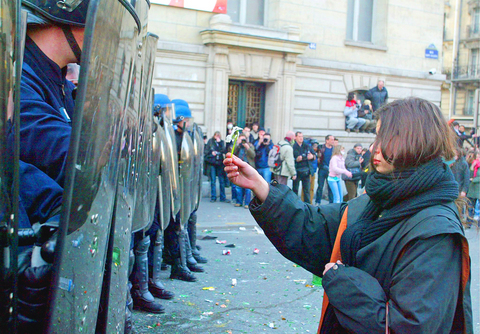Tens of thousands of students marched through Paris and other French cities on Tuesday, stepping up their opposition to a new law that makes it easier to hire -- and fire -- young workers.
In Paris, university and high school students, joined by teachers, workers, union members and Communist Party members, marched across town stopping traffic as they chanted slogans like "We're not cannon fodder" and "We're not young flesh for the boss." At one location near the Sorbonne in the heart of the Latin Quarter, the police clashed with small groups of protesters, dispersing them with tear gas.
More than half of France's 84 public universities remained either completely or partially closed on Tuesday because of student blockades, the Ministry of National Education said.

PHOTO: EPA
The Sorbonne, at the University of Paris, remained closed three days after riot police used tear gas to evacuate about 300 students. University authorities said the occupation had caused damages of between US$600,000 and US$1.2 million.
The protests are driven by two factors: domestic politics and the fear of change among France's middle and working class. This is not about promoting grand revolutionary ideals.
Designed by the government to help ease the crisis of high unemployment, particularly among disadvantaged young people in the suburbs, the law is seen by its opponents as a step toward eroding employment rights and benefits.
Opposition to the "first job contract" law, whose goal is to encourage firms to hire young people with little or no job experience, has confronted Prime Minister Dominique de Villepin with one of the most serious crises in his 10 months in office.
Under France's political system, de Villepin is the head of government and answerable to parliament. President Jacques Chirac, the head of state, is responsible for defense and foreign policy, and, whenever possible, tries to distance himself from domestic troubles. But he is expected to intervene when things get out of hand.
During a visit to Berlin on Tuesday, Chirac made his first public comments on the protests, telling reporters, "It goes without saying that I totally and unreservedly support the activities conducted by the prime minister and the French government."
De Villepin, whose approval rating has fallen to a record low of 36 percent in recent weeks, has become the target of opponents of the law. Even some members of his own UMP party have called on him to drop the hiring project.
He is widely expected to seek the presidency next year, but his candidacy could be crippled if the protests spin out of control and force the government to back down.
The students have the full support of both the parties of the left and the country's powerful unions, which contend that the law is unjust because it allows companies to fire workers under the age of 26 within the first two years of employment with little notice or severance.
Twenty-three percent of French citizens under the age of 26 are jobless; in some of the major city suburbs, which were wracked by riots lat last year, the figure is close to double that.

A feud has broken out between the top leaders of the far-right Alternative for Germany (AfD) party on whether to maintain close ties with Russia. The AfD leader Alice Weidel this week slammed planned visits to Russia by some party lawmakers, while coleader Tino Chrupalla voiced a defense of Russian President Vladimir Putin. The unusual split comes at a time when mainstream politicians have accused the anti-immigration AfD of acting as stooges for the Kremlin and even spying for Russia. The row has also erupted in a year in which the AfD is flying high, often polling above the record 20 percent it

Philippine President Ferdinand Marcos Jr yesterday vowed that those behind bogus flood control projects would be arrested before Christmas, days after deadly back-to-back typhoons left swathes of the country underwater. Scores of construction firm owners, government officials and lawmakers — including Marcos’ cousin congressman — have been accused of pocketing funds for substandard or so-called “ghost” infrastructure projects. The Philippine Department of Finance has estimated the nation’s economy lost up to 118.5 billion pesos (US$2 billion) since 2023 due to corruption in flood control projects. Criminal cases against most of the people implicated are nearly complete, Marcos told reporters. “We don’t file cases for

Ecuadorans are today to vote on whether to allow the return of foreign military bases and the drafting of a new constitution that could give the country’s president more power. Voters are to decide on the presence of foreign military bases, which have been banned on Ecuadoran soil since 2008. A “yes” vote would likely bring the return of the US military to the Manta air base on the Pacific coast — once a hub for US anti-drug operations. Other questions concern ending public funding for political parties, reducing the number of lawmakers and creating an elected body that would

‘ATTACK ON CIVILIZATION’: The culture ministry released drawings of six missing statues representing the Roman goddess of Venus, the tallest of which was 40cm Investigators believe that the theft of several ancient statues dating back to the Roman era from Syria’s national museum was likely the work of an individual, not an organized gang, officials said on Wednesday. The National Museum of Damascus was closed after the heist was discovered early on Monday. The museum had reopened in January as the country recovers from a 14-year civil war and the fall of the 54-year al-Assad dynasty last year. On Wednesday, a security vehicle was parked outside the main gate of the museum in central Damascus while security guards stood nearby. People were not allowed in because